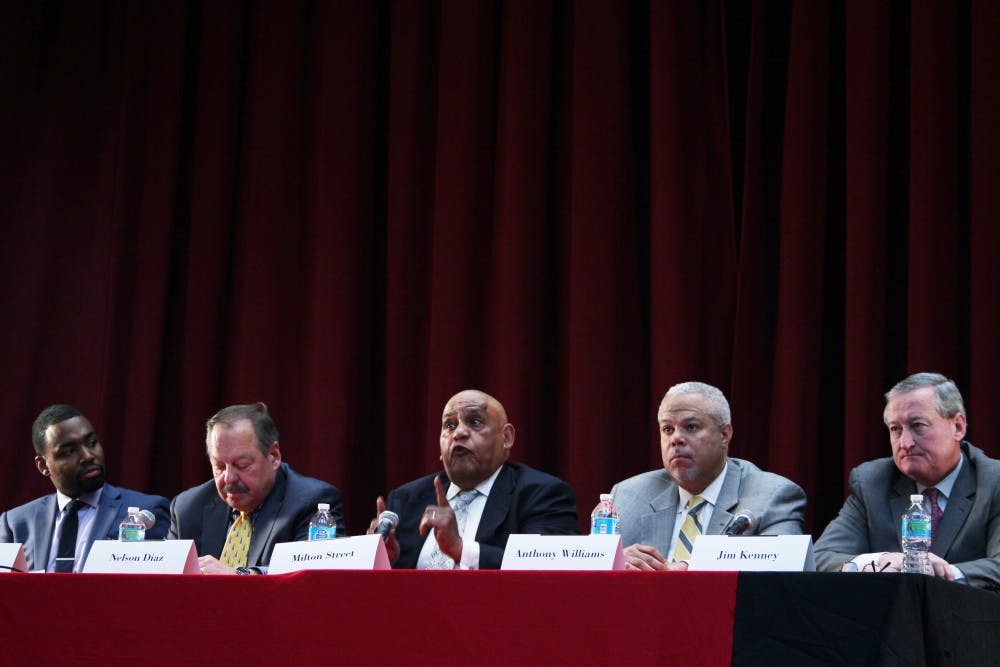
In a forum on education Tuesday night, five Democratic mayoral candidates responded creatively to questions and took the chance to critique each other's views.
About 400 people filled the auditorium at G.W. Childs School in South Philadelphia where candidates spoke on education, one of the most divisive issues of the race.
Organizers curated a list of questions that could be submitted by members of the public prior to the event — that was sponsored by a variety of neighborhood groups — which each candidate had a set amount of time to address. The only Democratic candidate missing was former District Attorney Lynne Abraham.
Despite various disagreements, the five candidates in attendance all criticized Mayor Nutter’s proposed 9.34 percent increase in property taxes — each candidate definitively saying "no" when asked to give a one word response to whether they agreed with the proposal.
The moderator, NewsWorks reporter Kevin McCorry, then asked the candidates for alternative funding ideas.
Former State Sen. T. Milton Street argued for the sale of city assets.
“I would absolutely sell the gas company,” he said in reference to the City’s refusal to sell Philadelphia Gas Works, a municipal utility company.
By not selling PGW, Philly politicians sent “a message to Harrisburg that you have assets down there that you can sell,” Street said.
Former City Councilman Jim Kenney and State Sen. Anthony H. Williams both advocated for the city government to take advantage of other revenue sources. For example, Kenney suggested reassessing taxes on properties with changed values and having vendors compete for city contracts, instead of the other way around.
Williams used the land bank bill passed last year as a positive example of city assets providing revenue.
“All of these programs close the pension gap and generate money for the city,” he said.
Former City Solicitor Nelson Diaz noted the future mayor’s plan will be dependent on how much success Governor Tom Wolf’s budget has in the Pennsylvania legislature.
Wolf’s recently unveiled budget asked for $159 million to be allocated to Philadelphia public schools.
Former Nutter Administration Press Secretary Doug Oliver proposed an audit of “how the school district currently spends its money," he said. Oliver suggested the possibility of schools staying open past 2 p.m.
Oliver was the only candidate to use Payments in Lieu of Taxes as another way to provide revenue for public schools, but saying that doesn’t “necessarily mean dollars. Yes dollars, but you can pay with time, you can pay with talent," he said.
The candidates were divided over the value of the School Reform Commission, the five member body which oversees Philadelphia schools. Diaz outright advocated to “abolish the SRC.”
“It hurts me [that] the SRC has become another patronage mill,” he said.
Williams doesn’t “have a problem with the SRC going away,” but desired greater district influence among the body members. Pennsylvania’s governor currently appoints three members of the commission, while the mayor appoints two members.
Kenney proposed a “hybrid SRC where there’s a bigger board and more participation from district residents.” Street, in his typical effusive style, ducked the issue of the SRC to note a racial divide among Pennsylvania legislators.
“We’ve got to go to Harrisburg and I’m going to put it right on the line — ask white legislators to give their white taxpayer’s dollars to Philadelphia to educate some black and hispanic children. It’s not going to happen,” he said.
“Wake up and taste the veggie burgers,” he exhorted afterward.
Williams sharply disputed Street’s characterization of the state legislature.
“The only person up here who has delivered a quarter of a billion dollars since 2010 is me,” Williams said. McCorry asked Williams if he deserved to take credit for that money when other legislators voted for the apportioned money as well.
“It was my legislation. That’s mine, so I take credit for it,” Williams said, adding that it is typical for candidates to advertise their legislative achievements in campaigns.
With a mayoral debate scheduled for May 4th at Temple University, these candidates will have plenty of issues left to sort out.
The Daily Pennsylvanian is an independent, student-run newspaper. Please consider making a donation to support the coverage that shapes the University. Your generosity ensures a future of strong journalism at Penn.
DonatePlease note All comments are eligible for publication in The Daily Pennsylvanian.








